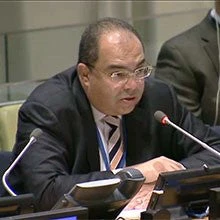Three billion people, nearly half the world’s population, is under the age of 25. Today’s youth will be the people most affected by the outcomes of the 2030 Agenda for Sustainable Development embodied in the Sustainable Development Goals (SDGs) adopted by the United Nations General Assembly on September 25, 2015. They will also be the ones responsible for implementing this global agenda as well as contributing to the solutions necessary to attain them.
The Sustainable Development Goals (SDGs), take a holistic approach to development and present a universal agenda to development. The goals encompass the economic, social, and environmental dimensions of development. In signing up to the goals and targets, the global community has agreed to a more ambitious development compact. Like their predecessor, the Millennium Development Goals (MDGs), the SDGs cover a broad range of interconnected issues, from ending poverty to addressing inequality, sustainable economic growth, to governance, to well-being, to global public goods, like climate change.
To realize this vision, a just-as-ambitious plan for financing and implementation is needed. In July 2015, a financing for development conference was held in Addis Ababa, which provided an outcome document outlining the financing for development framework to support the SDGs and the next 15 years of development.
Youth engagement throughout the design and implementation of the SDGs is critical for success. Ideas for Action (I4A), a youth development finance competition jointly organized by the World Bank Group (WBG) and the Wharton School of Business, encourages young people around the world to develop and share their ideas for financing solutions to help implement the SDGs.
The innovative and fresh ideas to tackle the new challenges the world faces will need to come from the youth, in particular. The I4A competition values the ideas, inspiration, and leadership of those who will soon assume global and local responsibility for sustainable development.
I4A offers the winners something more attractive than a financial prize, — access and opportunity. It provides opportunities for the next generation of leaders to contribute to the actions needed to attain the SDGs, narrative shaping the Post-2015 Development Agenda and its objectives, and as such take ownership over its implementation. It also provides access to some of the leading professionals in the global development industry and the private sector.
The I4A competition itself was driven by youth, which have been involved in every step of the process – from design to delivery. The first round of the competition drew global interest, reaching over 260 universities and organizations and 26,000 online users. The highest representation came from India, Nigeria, and Peru. Participants from 130 countries formed 330 teams to submit proposals to the inaugural Ideas for Action competition. The I4A winning teams and runners-up had practical approaches to their solutions, which included providing alternative workable scenarios or enhancing existing solutions through the utilization of new technologies.
I4A’s winning team, a small diverse team from the University of Pennsylvania, spent more than four months developing their winning idea. The team proposes creating two micro-insurance products for families heavily dependent on remittances: one to insure the stream of remittance income in case, for example, a worker falls sick, and one to redirect a portion of the remittance as health insurance for the family.
The second-place team, coming from Nigeria, proposes the development of an automated warehousing receipt system for improving access to customized financing for smallholder farmers in rice value chains in Nigeria. Through an innovative PPP model, the proposal demonstrates the potential of private and public sector resources to improve smallholder farmers’ access to financing. By using movable assets, such as inventory, as collateral to secure loans, smallholder farmers can get better access to agricultural inputs.
To ensure that communities can access the essential services they need, the third-placed team, from Peru, proposes a four-pronged approach to help local governments better prioritize community needs and engage local communities in how mining revenues are spent, namely to channel the investment of mining royalties into projects, designate an external agent of information and control as a mediator between the local government and communities, establish a project incubator and implement a system to enforce sanctions against violations.
One of the runner up teams proposes a dynamic online database of registered nonprofit organizations and selected social sector objectives that seeks to drive strategic philanthropy by making data transparent and accessible in the Philippines.
Another runner-up team, emphasizes that access to clean cookstove technology for citizens at the base of the economic pyramid can be directly improved through a participatory model of development impact bonds (DIBs). Their proposed bond model enhances the current structure of DIBs financially, while also building in an innovative component that supports local training, education, and knowledge sharing.
The final runner-up, looked into a crowdfunding marketplace as a potential avenue to raise money for development. This proposal outlines how the World Bank can test new funding mechanisms using Internet-based donation platforms.
The winning proposals included in a recently published book, as well as the 330 submissions received have demonstrated the innovative potential of the youth empowered by technology and sophisticated social media networks. Young professionals are clearly well equipped to think of creative solutions to tough development challenges.
It is with the hope that this initiative will provide additional space for the next generation of leaders and creative practitioners to break away from existing, approaches on development issues. The expectation is that it will help young professionals change the conversation about development in their own companies and organizations, and will lead to distinct, lasting, and substantial impact on development outcomes including the SDGs.
The second wave of the Ideas for Action competition was announced in Lima, Peru at the 2015 World Bank Group-IMF Annual Meetings and is already underway.


Join the Conversation